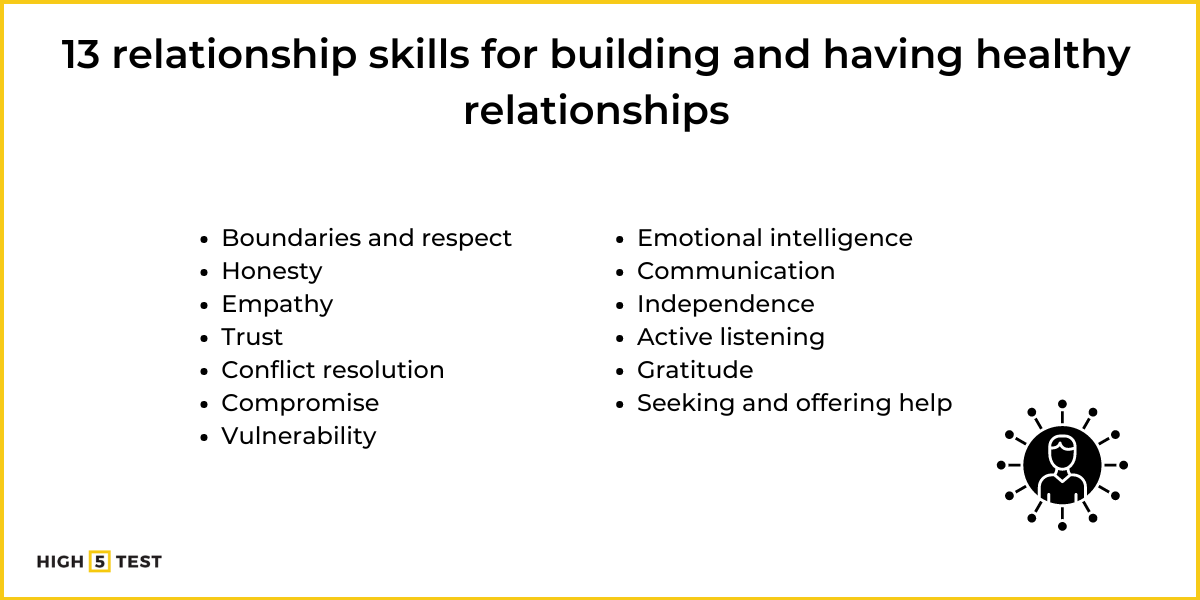Whether on the job or off the clock, healthy relationships are key to living a balanced and joy-filled life. Most people, however, have some difficulties building strong relationships with coworkers and romantic partners, which can create ongoing conflict at work, home, or both. The good news is that shaping powerful connections takes skill, and skills can be learned. Additionally, while everyone can feel weak in some relationship-building areas, each of us also has unique strengths to bring to all of our interactions.
One tool to uncover those strengths is the HIGH5 strengths assessment. This tool provides personalized insights into your top strengths, empowering you to leverage your natural talents in building healthy relationships, whether in your personal life or professional endeavors. By understanding your strengths, you can develop a tailored approach to fostering meaningful connections and achieving long-term success in all areas of your life.
However, there are many barriers that stop individuals from forming happy relationships. Some people struggle with communication, do not have confidence in their abilities, or generally lack the ability to empathize with partners and coworkers. In this case, focusing on building your relationship skillset is crucial. Luckily, this does not require a plethora of time-consuming additional activities. In this article, we will help you discover how to build stronger relationships and why doing so is extremely important.
What are relationship skills?
Before you dive into trying to build relationship skills, you need to truly understand what these skills are, how to use them, and why they matter. In general, relationship skills are any abilities that help you connect with others and form bonds. Relationship skills can take many forms and function differently in different environments. For instance, the relationship skills that help you build bonds with employees share similarities with qualities that help you build romantic relationships, but the way you use those skills at your job will operate differently outside of work.
The key to using relationship skills effectively is ensuring that the connections they build are healthy in the long-term. A strategy that allows you to overcome peer conflict for a day but does not prevent long-term conflict is not a truly successful relationship skill. Some of the most powerful relationship skills include clear communication, compromise, empathy, bond-building through emotional connection, and boundaries, just to name a few.
Why is it important to recognize and work on relationship skills?
With all the emphasis on the value of technical skills in today’s market, so many forget the importance of soft skills like those that build long-term relationships. Nonetheless, without competency in communication, empathy, and even gratitude, you are at risk of suffering a lack of success both in your career and outside of it.
The HIGH5 strengths assessment can be a powerful tool in this journey, providing personalized insights into your natural talents and enabling you to leverage them effectively in fostering meaningful connections. By aligning your approach with your unique strengths, you can maximize your happiness and success in all aspects of your life, from personal relationships to professional endeavors.
Some specific benefits of boosting relationship abilities include:
- An increase in career opportunities and better chances to meet more of your goals
- Becoming a more valuable team member
- Enhancing your positivity and levels of success in your romantic relationships so that they don’t interfere with your job performance and vice versa.
- Improvement in both individual productivity and team productivity
- A greater sense of satisfaction and passion in your work
- Improved employee retention rates for businesses
- A boost in physical health and a decrease in your risk of several physical and mental disorders
- Increased creativity and confidence in your abilities
- Deeper Helps you develop deep bonds with your partner, so your relationship lasts long-term, and you avoid the pain of breakups.
Pro Tip From HIGH5
After taking the HIGH5 assessment, reflect on how your top strengths can contribute to building stronger relationships. For example, if one of your strengths is empathy, practice actively listening and seeking to understand others’ perspectives in your interactions.
13 examples of relationship skills
There are many different types of abilities included under the broad category of relationship skills. Once you identify the strengths you already have by taking the HIGH5 assessment, the list below can help you understand which skills you should focus on first.
- Boundaries and respect
- Honesty
- Empathy
- Trust
- Conflict resolution
- Compromise
- Vulnerability
- Emotional intelligence
- Communication
- Independence
- Active listening
- Gratitude
- Seeking and offering help

Boundaries and respect
Boundaries are the choices we make to identify what behaviors from ourselves and others help us feel supported and which behaviors we’d do better to avoid. Many relationships encounter issues when one partner does not know how to set boundaries. This could lead to individuals being used, which undermines the purpose of a true relationship.
You need to clearly set your boundaries to protect yourself, your coworkers, and even your romantic partner. For example, you could tell your partner that you will not eat meat that is not halal, because according to your religion, it is immoral. A true partner would respect that boundary.
Honesty
Ensure that you are honest with both your partner and your team members at work. Honestly will strengthen your bonds and allow you to connect further. Honesty also helps you avoid miscommunications and misunderstandings, saving everyone time and frustration. At first, consistent honesty may sound daunting, but if you develop the courage to truthfulness into your regular life, you will find it becomes second nature.
Empathy
Being able to empathize with others is a great skill to have in relationships. Empathy is the ability to understand another person’s emotional life, both the joyful and the painful. Empathy allows you to understand others on a deeper level, allowing you to see both successes and struggles through their point of view.
Without empathy, you can never truly understand others, which makes it difficult to show them respect and kindness. By gaining this skill, you will improve your understanding of both your partner and the world as a whole.
Trust
Trust is the foundation of every great relationship. Without trust, individuals never feel safe with their partners, which creates long-term issues like defensiveness and contempt. Being trustworthy allows you to stop worrying your partner will discover something about you that you wanted to keep secret. Trust also helps you relax because you don’t waste energy constantly monitoring and micromanaging your partner.
Trust is earned, not given. When a relationship begins, it is understandable that you would want to avoid giving your partner that level of trust. However, once trust has a chance to develop, partners are free to be themselves without feeling a need to track each other 24/7.
Conflict resolution
No matter how hard you try to avoid it, you will encounter conflicts within your relationships. Even in fantastic relationships, occasional disagreements (and rarely, genuine fights) do occur. In fact, the key to a truly long-lasting relationship of any kind is the rupture-repair cycle, in which the people in a relationship rebuild and strengthen their connection after a disagreement (2).
Conflict resolution skills help you decrease the negative impacts of conflict. Instead of letting a fight ruin your day or entire relationship, you can find a way to overcome your differences and come to a solution. Often, this will involve being honest about your mistakes and expecting the same from others.
Compromise
Another key element of conflict resolution, as well as maintaining a healthy relationship in general, is the ability to compromise. You will not always get everything you desire in a relationship. A fair compromise is one of the best ways to avoid conflicts in those situations. It takes time for two people to come to an understanding of what ‘fair’ is, but, by having an open conversation with your coworker or partner, you can determine what is truly crucial for both of you and make a decision from there.
Vulnerability
Intimacy is a staple of a great relationship. Intimacy can’t exist without vulnerability, a willingness to be open with others and take healthy risks. When thinking of vulnerability, many people imagine someone sobbing and overwhelming another with a list of their problems. This is not exactly true vulnerability. Being vulnerable involves sharing things that may be difficult to communicate, but this transparency will help you realize how you and your teammate or partner can support each other in a healthy way.
Emotional intelligence
Having emotional intelligence will benefit both you and all those around you (1). In general, emotional intelligence is the ability to deeply understand your feelings, reflect on them, and also connect your knowledge of emotions to times when someone else is feeling emotionally distraught. Emotional intelligence can help you prevent conflicts, as it allows you to stay in control of your feelings. It can also help you give better advice when someone at work or at home is stressed or down.
Communication
Communication is essential to many areas of life, including both work and romantic relationships. A good communicator will say what they mean in such a way that the listener will understand. Communication is about more than just talking, though. It also involves listening to your colleague or partner and acknowledging the topics you may not talk about. Having an open channel and ensuring people know you are willing to listen is as crucial for great communication as the actual discussions are.
Independence
Feeling “chained” to a workplace or a romantic relationship is a sign of micromanagement and a lack of trust. The result of a trusting relationship and mutual respect is a relationship where both parties have independence. This is especially important with a romantic partner. Spending time on activities without your partner will allow you to have some alone time, which is great for reflection. Or, if your partner is really craving an opportunity to go somewhere that doesn’t interest you, you both should be able to satisfy your desires while maintaining a deep connection over your shared interests and respect.
Active listening
Active listening involves fully concentrating, understanding, and responding to what is being said. An active listener doesn’t just hear words. An active listener understands the complete message being conveyed. Some ways of developing active listening skills are to focus on the speaker without interrupting, reflect back on what you’ve heard to confirm understanding, and asking open-ended questions
Gratitude
Gratitude is the practice of recognizing and appreciating the positive aspects of life and expressing thanks to those who contribute to your well-being. When we express gratitude regularly to both our colleagues and our partners, we boost morale and strengthen bonds. This is why it is so important to make a habit of acknowledging and appreciating the efforts of others.
Seeking and offering help
Being open to seeking help when needed and offering assistance to others fosters a supportive and collaborative environment. Don’t hesitate to seek support when needed. Be equally ready to lend a helping hand to others. Reciprocity builds mutual respect, both at work and at home.
How to identify relationship skills?
Knowing how to incorporate relationship skills into your toolset can be very helpful in a wide range of situations. It will allow you to lead a more fulfilling life, boost your career opportunities, avoid breakups, and generally increase your happiness. However, many people become confused about how to gain these skills. Before you invest in 20 books by relationship gurus, consider the following:
Firstly, there is a quick, effective way to identify your relationship skills without spending a single penny. The HIGH5 assessment is a free tool that will provide you with a list of your top relationship skills in just a few minutes. With HIGH5, you will not only get a list of strengths you use in relationships but also a general list of strengths you use daily.
There are a few other ways to find your top relationship strengths. If you have a partner already, you can ask them about what makes them interested in you. However, this takes a great deal of confidence, and it can be a bit awkward if you are already insecure or if you lack the humility to learn from the other person’s opinions. Ensure that you already have an established relationship before asking.

How to improve relationship skills in the workplace?
Relationship skills are useful outside of just romance. Relationship skills used in the workplace require a slightly different approach and different nuances to these skills, but they can still help you succeed in the workplace. One of the best ways to improve your relationship skills is by trying practicing active listening with others when they speak. This is a relatively simple strategy that nearly anyone can implement. When you ask a question, listen to the other person, and try to reflect on what they say. Ask questions more often to get a better understanding of their thoughts, feelings, and desires.
Another way you can improve workplace relationship skills is by observing what your top relationship skills currently are. Instead of focusing on turning relationship weaknesses into strengths, you can build upon your strengths. For example, take more opportunities to work on group projects if you see communication as a strength. If you know empathy is your strength, make yourself available to show your coworkers that you understand them.
Why building relationship skills at work matters?
Relationship abilities matter for activities outside of just loving your partner. At work, these competencies can boost your productivity and efficiency. This is because individuals with relationship skills are often able to navigate team projects more effectively, and they have the confidence to reach out to others for help.
Plus, relationship skills at work can also help you build bonds with coworkers. Not only will this potentially benefit you by helping you reach your goals, but it also serves an emotional benefit. Your work will be more fulfilling if you are emotionally connected to it and the people you work with.
5 ways the best leaders are always building relationship skills
The best leaders understand the importance of leveraging their team’s collective strengths, including those that contribute to building strong relationships. By utilizing tools like the HIGH5 strengths assessment, they can gain valuable insights into their team member’s unique talents and strengths, enabling them to foster an environment where individuals can thrive and collaborate effectively.
By aligning roles and responsibilities with each person’s natural strengths, leaders can consistently work on ways to improve their team’s performance, reach their goals, and boost passion. In the long run, this will make a successful leader stand out from the crowd. Some of the strategies great leaders use to build their relationship strengths include:
Knowing their strengths and weaknesses
Self-awareness is important in many facets of life. However, it is especially crucial when you are trying to develop strengths. Great leaders know their strengths and weaknesses, as well as how this combination of strengths and weaknesses impacts their team. If you understand your top relationship strengths, you will be empowered to use them more often, giving you confidence and boosting efficiency.
Pro Tip From HIGH5
As a leader, encourage your team members to take the HIGH5 assessment. Use the insights gained to intentionally assign tasks and projects that align with their strengths, facilitating effective collaboration and fostering a positive, strengths-based team culture.
Delegating less important activities and having a solid decision-making process
A leader cannot do everything themselves. After all, this is the purpose of having a team in the first place. The best leaders know how to delegate tasks that do not align with their own relationship strengths to team members who are skilled at those tasks. Such leaders have a strong understanding of their employee’s strengths, often from test data and performance reviews.
Developing strong soft skills and interpersonal abilities
Leaders who succeed know how to best motivate their team without giving them tasks overwhelming tasks. Team leads know how to compliment a team member to encourage them without inflating anyone’s ego. Great leaders also combine skills such as empathy, recognizing the needs of others, building rapport and long-lasting relationships, developing trust by following through on their promises, and much more.
Using the participative form of management
There are many different types of leaders. Some are authoritarians, others laissez-faire, and most are a combination of these with one style being more predominant. Those who use the participative leadership style tend to find more success and support. They build stronger bonds with their employees, know how to get employees excited, give employees a sense of importance, and have strong leadership skills.
Giving meaningful and inspiring input
Leaders who give feedback without any emotional connection or inspiration often leave employees feeling uninterested in self-improvement. However, leaders with great relationship skills know how to provide constructive feedback while still getting an employee on board with trying new strategies and building upon their strengths. Try to be honest and specific, but also be aware of your employee’s emotions. Help them understand they bring value to the team before bringing up any weaknesses.
How to avoid relationship killers in the workplace?
To maintain healthy workplace relationships, it’s crucial to avoid behaviors that can damage trust and morale. Avoid gossiping about colleagues, as it breeds mistrust and negativity. For instance, instead of discussing a coworker’s mistakes behind their back, address issues directly and constructively. Additionally, steer clear of micromanaging, which can stifle creativity and lead to resentment. Trust your team to handle their responsibilities and provide support when needed.
What are relationship skills activities?
Relationship skill activities are that help individuals boost their current relationship abilities while also building new relationship skills. There are numerous ways to bring relationship-building activities into both the workplace and into relationships outside of work. Before you implement an activity, consider using the insights from the HIGH5 strengths assessment to identify the specific relationship skills your team needs to develop further.
For example, if trust is an area of growth, you could leverage the strengths of your team members by designing a free-fall activity that allows them to showcase their natural talents. If communication is a focus area, you could tailor a classic game like “Telephone” to highlight and exercise the communication strengths present in your team. If general teamwork and problem-solving are the skills they need to work on, try “The Human Knot.”
This game involves having participants join hands and tangle themselves up before untangling their knot. In general, there are many activities to choose from. But, before making a decision, define the purpose of the activity and focus on a single skill.
Pro Tip From HIGH5
Use the HIGH5 assessment data to create personalized relationship-building activities that allow individuals to leverage their unique strengths while also developing areas for growth. This tailored approach can make the learning experience more engaging and impactful.
Relationship skills FAQ
What are 3 important relationship skills?
There are a plethora of relationship strengths, and each of them is important. Which ones are more or less crucial depends on numerous factors, like the type of relationship, your goals, and your existing strengths. The first relationship skill to master is communication. Communication is used in every industry and relationship. Your value to your team and your relationship depends highly on your ability to reflect on what you mean to say and communicate it clearly with an inviting tone and body language. However, active listening is a key part of skillful communication, because it helps you understand what another is trying to say, but also because active listening communicates to the speaker that what they have to say matters.
Additionally, conflict resolution is vital to success. Conflicts crop up in every job, romantic partnership, and even friendship. The ability to come out closer on the other side of those conflicts is key to having a resilient relationship of any kind (3). Third, you should focus on building emotional intelligence. This critical skill empowers you to evaluate your own emotions so that you can approach others in the most inviting way possible and respond positively to the expression of their emotions. In addition to the clear benefit this has for improved closeness in romantic relationships, this in turn has the power to improve your performance in your career (4).
What skills help build relationships?
Your bonds can be strengthened if you communicate consistently. Consistent, open, and honest communication can help you take relationships to a deeper level and help you avoid misunderstandings. In addition, honesty and trust allow you to avoid micromanaging and creating resentment. Empathy, vulnerability, setting boundaries, conflict resolution, and mutual independence all help build healthy relationships.
What are the 5 C’s in a relationship?
The 5 C’s in a relationship are Communication, Commitment, Compassion, Compatibility, and Compromise. These elements help build and sustain strong, healthy relationships.
References:
- Van Oosten, E. B., McBride-Walker, S. M., & Taylor, S. N. (2019). Investing in what matters: The impact of emotional and social competency development and executive coaching on leader outcomes. Consulting Psychology Journal: Practice and Research, 71(4), 249–269. https://doi.org/10.1037/cpb0000141
- Morton, M. (2016) We Can Work it Out: The Importance of Rupture and Repair Processes in Infancy and Adult Life for Flourishing. Health Care Analysis, Vol 24, (pp. 119–132). https://doi.org/10.1007/s10728-016-0319-1
- Safran, J. D., Muran, J. C., & Eubanks-Carter, C. (2011). Repairing alliance ruptures. Psychotherapy, 48(1), 80–87. https://doi.org/10.1037/a0022140
- Uhrich, B. B., Heggestad, E. D., & Shanock, L. R. (2021). Smarts or trait emotional intelligence? The role of trait emotional intelligence in enhancing the relationship between cognitive ability and performance. The Psychologist-Manager Journal, 24(1), 23–47. https://doi.org/10.1037/mgr0000112






